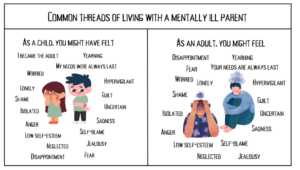Share This Story, Choose Your Platform!
When A Parent is Affected by Mental Illness: Navigating Life’s Challenges
Living with a parent suffering from a mental illness can leave a profound impact on your life, both psychologically and emotionally. While there are numerous articles addressing individuals experiencing mental health challenges and how to lead fulfilling lives despite them, little attention has been given to the experiences of their family members. Recently, there has been a growing awareness that mental illness affects not only the individual but also their entire family. The American Psychological Association acknowledges that a person’s mental illness can have far-reaching effects on their family members. Therefore, this article aims to provide support for you, the child of a parent suffering from a mental illness.
Your experience may differ from others’, depending on whether your parent sought help or not. Each situation carries its own stressors, such as emotional abuse, neglect, or trauma. However, common threads have been identified.

As an adult, you may find that the aforementioned points still resonate with you. If so, rest assured, this is entirely normal. You employed these coping mechanisms to navigate through challenging times. However, these strategies may no longer serve you well. Perhaps they are impacting your current relationships—be it friendships, work dynamics, or romantic partnerships—or hindering you from forming new connections. If so, now may be the time to seek assistance.
Seeking help can be daunting, especially if you grew up in an environment where it was not encouraged. The process can be lengthy and emotionally draining. Take it one step at a time and be compassionate with yourself. Progress at your own pace and remember, even in moments of doubt, you have the capacity to lead a fulfilling life.
If you are ready to embark on this journey, here are some helpful tips compiled by TherapyCentral:
- Educate yourself about your parent’s mental illness. Understanding its causes, triggers, and treatments can provide insight into your parent’s experiences. Additionally, research suggests that children of parents with mental illness may develop similar issues, so familiarizing yourself with the illness can help you recognize and address any symptoms you may be experiencing. However, not all children develop a mental illness; therefore, it’s essential to seek guidance from a psychologist or doctor rather than self-diagnose.
- Accept your parent’s mental illness. Recognize that your parent is an individual grappling with a condition they did not choose. Showing understanding, patience, and compassion towards them is crucial. It is unlikely that your parent ever intended to cause you harm.
- Maintain boundaries. It can be challenging to establish and uphold boundaries, but they are vital for communicating your expectations regarding how you should be treated. Recognizing your limits can aid in coping.
- Prioritize self-care. It’s okay to take time away from your parent for your own well-being. Prioritizing your needs enables you to care for yourself and reduces the risk of burnout or illness. Taking care of yourself is the most effective way to support your parent.
- Find meaning in your experiences. Despite the hardships, there are lessons to be learned. You may discover strengths within yourself that you never knew existed, such as resilience, empathy, or the ability to advocate for others in similar situations. Finding meaning can facilitate acceptance.
- Seek out a support system. Surround yourself with individuals who make you feel valued, understood, and safe. This could include family members, friends, religious communities, or support groups.
- Cultivate hobbies. Engage in activities that bring you joy and promote relaxation. Consistency and routine can enhance the benefits of these hobbies.
- Practice mindfulness. It is natural to experience emotions such as anger, worry, self-blame, or guilt when dealing with a parent’s mental illness. However, dwelling on these emotions is not conducive to your well-being. Remember, you are not responsible for your parent’s mental illness, nor are you obligated to “fix” them. Your primary responsibility is to take care of yourself. You are not a failure, and their illness is not your fault.
- Seek professional help. While the aforementioned steps are beneficial, seeking guidance from a counselor or psychologist can provide additional support in a non-judgmental environment. Help is available not only for your parent but also for you.
Living with a parent who suffers from mental illness can be incredibly challenging, but it doesn’t define you. By taking proactive steps and seeking support, you can build a fulfilling and resilient life. Remember, you are not alone, and help is always available.
For more information, look at the websites below, or visit https://www.humanitas.co.za for free counselling sessions.
Author: Kendra Allwright

References:
https://therapy-central.com/2022/09/26/how-to-cope-with-a-parent-with-mental-health-issues/
https://www.parents.com/health/mental/the-challenges-of-having-a-parent-with-mental-illness/
https://www.psychologytoday.com/us/blog/head-games/202109/what-its-be-the-child-mentally-ill-parent
https://www.apa.org/topics/mental-health/serious-mental-illness


